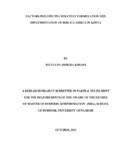| dc.description.abstract | The objective of the study was to determine the factors influencing the strategy formulation and implementation of Biblica Africa in Kenya. Case study method was used to achieve this objective. Data was collected by use of an interview guide. Data was qualitative in nature hence analyzed using conceptual content analysis. The study found that strategy has helped break down the major aspects of Biblica vision which are ‘everyone’, ‘gets God’s word’ and ‘are transformed’. BOD, GELT, and AMT are involved in strategy formulation. Factors that are taken into account when setting objectives include product, time, personnel, political and economic climate while factors that affect goals of the organization and its future success include finances, translation projects, and personnel. Factors that align the organization’s performance with its intended plans include finances, translations, technology and branding. Simplicity, customization, financial capacity, personnel, and market indicators form the criteria used when choosing the organization’s strategy. GELT, ALT and NDs are involved in strategy implementation. Strategy implementation affects Biblica’s finances, information communication technology (ICT), and human resources as they are important elements in steering the direction of the organization. When equipping those involved in strategy implementation, Biblica considers the expected results, financial, branding and reputational aspects. The global BOD approves strategy while GELT communicates and monitors strategy implementation. Control mechanisms put in place to monitor strategic implementation include reporting, monthly meetings and visits by the AMT. Challenges encountered in formulating and implementing strategy in Biblica include finances, personnel related issues and contextualization. The criteria used when choosing the organization’s strategy reflects the factors that align the organization’s performance as well as factors that affect goals of the organization and its future success. This study recommends that the government through its regulatory agencies should consider the goals and objectives of Biblica Africa Kenya to enable contextualization of its strategy in Kenya. Biblica Africa Kenya should consider more diverse financially sustainable projects to enhance its operations. The study also recommends the inclusion of national directors in the strategy formulation stage. | en |

